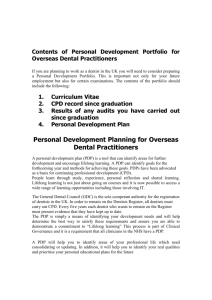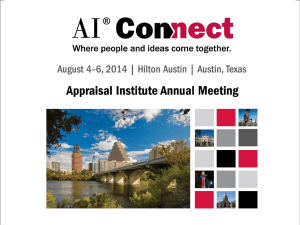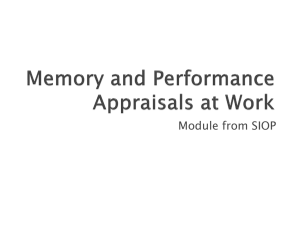Handbook for DCP appraisal - Health Education North West
advertisement
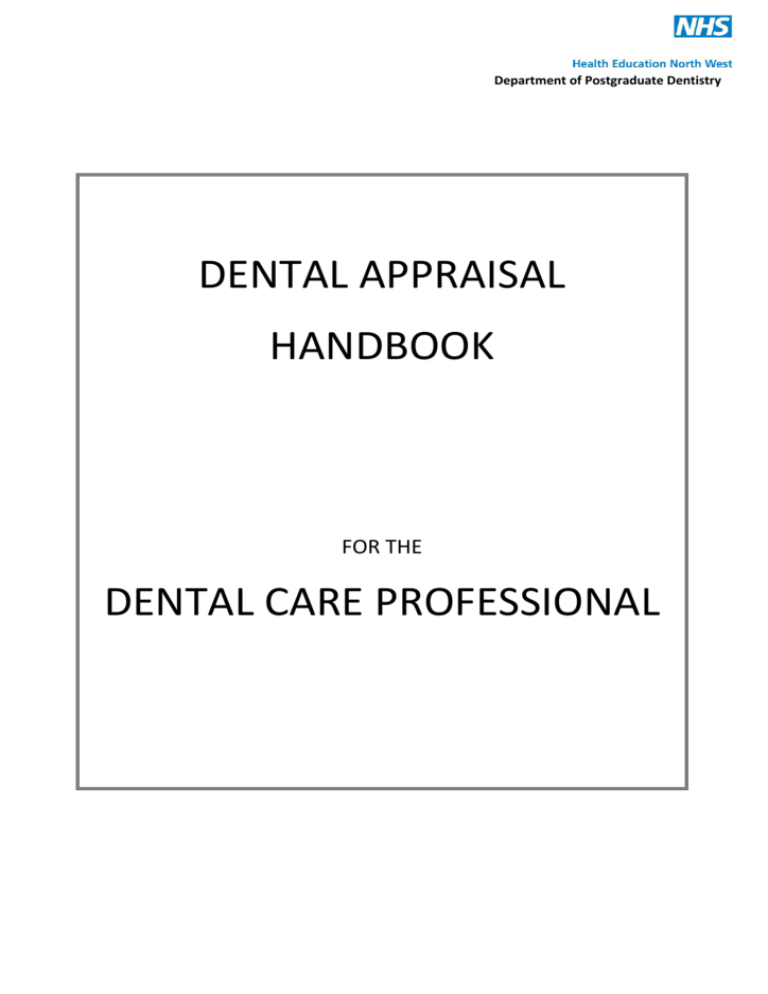
Department of Postgraduate Dentistry DENTAL APPRAISAL HANDBOOK FOR THE DENTAL CARE PROFESSIONAL Introduction to Appraisal for DCP’s Appraisal is used as a method of establishing what your current learning needs are. It is a formative process with summative elements. This means that its purpose is to develop your skills and competence in your role but that you will be required to supply measurable evidence to establish your current standard. It is not a disciplinary tool. You are required to consider all the work that you do in your role and reflect on your skills and competence in each situation. It is only through honest reflection that you will be able to determine where your weaknesses lie and thereby create a plan to address those identified learning needs. This is known as a personal and professional development plan (PDP). The courses and other means of addressing each element of the plan are known collectively as continuing professional development (CPD). If you are registered with the General Dental Council (GDC) you will already be aware that you have to satisfactorily complete appropriate courses throughout the year to ensure that you maintain your skills and competence in the work you undertake within your scope of practice. CPD for dental professionals is defined by the GDC as: ‘lectures, seminars, courses, individual study and other activities, that can be included in your CPD record if it can be reasonably expected to advance your professional development as a dental care professional and is relevant to your practice or intended practice.’ In the future, the GDC plans to establish a relationship between the CPD you undertake with the PDP you have created and maintained. It is only through a robust process of establishing your learning needs that you will know that you are doing the right courses for your individual situation. The ‘Standards for the Dental Team’ states; 6.6.1 You should make sure that all team members, including those not registered with the GDC, have: • a proper induction when the first join the team; • performance management, including regular appraisals; • opportunities to learn and develop;… It is as a result of this statement that this handbook has been drafted to assist Practices, and those who manage them, access a quality assured, robust Appraisal process for their staff. As you work through the book you will find the explanations of what you have to do. Your managers/appraisers must be able to use the process appropriately to ensure that it is going to be effective and meet the standard expected of the GDC. Page 1 The GDC, in its work regarding revalidation of professional registrants, has usefully described four Domains that the Appraisee should consider as they reflect on the work they carry out in practice. These Domains are applied throughout the Appraisal process and overlap considerably. Your portfolio – or record – of your achievements will also contain information that could be applied to more than one Domain. Indeed, the overarching Domain of Professionalism encompasses all the other Domains. PROFESSIONALISM COMMUNICATION CLINICAL CARE MANAGEMENT AND LEADERSHIP Page 2 Time Frame Your manager/appraiser will require the completed workbook and supporting evidence approximately 2 weeks ahead of the Appraisal meeting. This means that you should be making a start a few weeks before that, giving yourself about 2 weeks to prepare. Don’t leave it until the last minutes as this will undermine the value of the appraisal discussion. Completing the workbook Once you have worked through the paperwork you will need to gather the information you require to provide evidence of where your skills and competence currently lie. This can be quite daunting, but please remember that you provide what you can, knowing that if you lack any significant evidence it can be entered on your PDP as something you can work towards for your next appraisal. The sort of evidence suggested by the GDC, modified to apply to DCP’s, has been tabulated below and is taken from www.gdc-uk.org.uk Domain Source of evidence Clinical Record keeping Audits Direct Observational Procedures Radiographs Multi Source Feedback (MSF) Copies of letters Involvement in complaints procedures Communication Professionalism Portfolio evidence PDP and CPD records Multi Source Feedback, Peer observation reports Minutes of meetings Quality of evidence in portfolio Letters Appraisal notes Reflective notes Copy Report Copies Copies Copies Copies Copies Copies Copies Copies Copies Management & Third party accreditation – BDA, FGDP, Certificates/ reports leadership Denplan Excel etc. Minutes of meetings Copy PDP Copy Accredited training Certificates Audit Copies You do not have to collect everything listed above, only those documents that are of relevance to your statements and that you have available. Page 3 You will need protected time for your appraisal which should take about an hour. Confidentiality You will retain the content of your workbook so that you can be as honest as possible in your reflection and commentary. Your Appraiser will have taken the time to read through your completed workbook and had a look at the evidence you have provided. If they believe that there is more you could provide they will inform you of this ahead of the appraisal meeting. Your Appraiser will make notes of possible topics to explore with you particularly if there are gaps in your evidence that require addressing. The Appraiser will be bound to confidentiality in your discussion unless something comes to light that may impact on patient safety. You may give your Appraiser permission to involve 3rd parties at any time, if it is in your interest to do so. What happens to your PDP? The ‘Part C’ is the only part of the Appraisal documentation that is copied and kept in your staff file. This part of the paperwork provides the information supporting your appraisal discussion and is the basis on which your PDP is formed. If you were ever asked to provide evidence – say to the Area Team or the GDC - of how you created your PDP, then this is what you would supply. The PDP is made up of the action points listed at the bottom of each Domain in Part C, prioritized according to the most important in your development, agreed with your Appraiser. The PDP should detail your learning/development needs, how you intend to address them, a target date to complete them and a description of how such development will improve the patient outcome and/or your own practice. Once you have created your PDP you will be able to display it for ease of reference and get relevant parts signed off when you satisfactorily complete any part of it. It should be kept, on completion, for your next appraisal as a means of demonstrating your professionalism and your commitment in keeping up to date and improving your practice. Page 4 CPD Portfolio It is useful to collect your evidence in a portfolio so that subsequent appraisals will be easier. The GDC has plans for revalidation of its registrants and it is expected that your portfolio will become a valuable tool to demonstrate the following: a. Evidence of regular appraisal b. A personal development plan c. Evidence of Continuing Professional Development d. Working in an accredited environment e. Examples of reflective practice More weight is to be given to verifiable CPD and its relationship with your scope of practice. Verifiable CPD is activity that meets the GDC definition of CPD and for which there is documentary evidence that you have undertaken the CPD and that the CPD has: ■ ■ ■ concise educational aims and objectives; clear anticipated outcomes; and quality controls. This is set out in law. You must keep documentary evidence of all the verifiable CPD that you have done for 5 years. If you are a dental care professional your first five year cycle will begin on 1st August in the year after you first register. You must carry out at least 150 hours of CPD every five years. At least 50 of these hours need to be ‘verifiable’ CPD. As you begin to collect certificates to attest your CPD please take a few moments to complete a reflection on any course undertaken with the learning outcomes on the back of the certificate. If you get into the habit of doing this you will find appraisals a very straightforward process and quickly update your PDP as your career progresses. One of the benefits of regular appraisal is to stimulate an interest in professional development and increase job satisfaction. It is for everyone’s benefit – your employer, colleagues and not least, the patients - if all the team work towards improving the patient experience and reduce the margin for error. Page 5 Pre-Appraisal Forms Part A To be read alongside Part B Appraisal for Dental Care Professionals (DCP) is a confidential process aimed at assisting these Professionals to help and facilitate the safe provision of quality care for Patients. The outcome of the Appraisal will be a Personal Development Plan that reflects the considered needs and aspirations of the DCP through the assistance of an appropriately trained Appraiser Page 6 Appraisal for Dental Care Professionals It is strongly recommended that you look at Standards for the Dental Team provided by the General Dental Council before you start. There is an interactive site available for you to access at http://www.gdc-uk.org/Dentalprofessionals/Standards/cases/Pages/default.aspx So that your Appraiser is able to get a proper idea of your current level of competence and ability you are asked to assemble a portfolio of material to support any statement you make in Part B which will be the main basis of your appraisal. The same headings will be used to summarise your appraisal discussion. The wording under each heading differs, but typically you are asked to provide: o o o o a commentary on the work you currently undertake an account of how your work has improved since your last appraisal, if applicable your view of your continuing development needs – what you need to do to improve a summary of factors which constrain you in achieving what you aim for. It is not expected that you will provide exhaustive detail about your work. But the material should convey the important facts, features, themes or issues, and reflect the full span of your work as a DCP within and outside the NHS. The form is a starting point and framework to enable you and your appraiser to have a focused and efficient discussion about what you do and what you need. It is a tool, not an examination paper or application form, and it can be completed with some flexibility. Common sense should be exercised if you feel you are repeating yourself, or if you want to include something for which there is no apparent opportunity. And if a section or a page really needs only a word or two there is no need to do more. Complete as many sections as are relevant to your work. The work you put into completing this form is your main preparation for appraisal, and the value of your appraisal will largely depend on it. It will also be an important part of your appraiser’s preparation and will assist them in making the appraisal discussion relevant to your needs. The form is fairly open-ended, although some prompts and suggestions are supplied to help you. Please expand the spaces available as necessary, or attach extra sheets. You are invited to submit documents in support of what you say in the form. You are not expected to “prove” your assertions about your work, but your appraiser will probably want to test some of them with you through discussion. The documents will help both of you. The papers you assemble in support of the form should be listed in the appropriate spaces and supplied for your appraiser in a folder, organised in the same order. If the same material is listed in the form more than once, to illustrate different points, do not include it twice in the folder but explain, on the form provided, where it is to be found. You are invited to go through each Domain reflecting on your self-assessed abilities and working out from this reflection where you have learning needs. This is called a SWOT analysis; Strengths where you are already working well Weaknesses where improvements could be made Opportunities what is available to you to address your identified weaknesses Threats what constrains or stops you making the most of these opportunities Page 7 Section 1: Good Clinical Care DCP’s have a range of clinical skills reflected in their Scope of Practise. There is a duty of care to Patients that requires all Registrants to keep up to date in these skills. The questions you ask yourself as you reflect should be directed at all the operational duties you perform in the surgery on a regular basis. This section focuses on your clinical role and invites you to ask the basic question “how good is my practise and how can I show it?” What do I understand my main duties and responsibilities to be? Am I included in Team decisions? Can I offer more? What skills, capabilities and experience are required for me to be competent in my role within the Practice setting? What was the most helpful course I attended last year? What changes to my scope of Practice did I make as a result? Have I in the past year provided/assisted in a course of treatment that concluded with a particularly good outcome for the patient? Have I in the past year undertaken/been asked to undertake a course of treatment which, on reflection, was beyond my current knowledge, competence or ability? Have there been significant events/ near misses that have not been logged and/or changes made to reduce the risk of re-occurrence? Have you participated in any clinical audits that reflect a need for improvement in your clinical abilities or confirm you are providing good quality treatments/service provision? Section 2: Communication –How Well Do I Relate to Patients and Keep Them Informed? Acting in the best interests of patients is fundamental to our work in the dental profession. How well do you relate to the patients, whilst respecting their diversity and equality, and assist in keeping them informed of all their choices? Before filling in this section, please read the relevant section of the GDC document “Standards for the Dental Team.” You may also find it helpful to review their document “Principles of Patient Confidentiality.” (See www.GDC-UK.org) You may find it helpful to consider the following questions: Are the clinical records I write consistently clear and legible (if handwritten)? Have I had sufficient training in good record keeping? If writing for the Dentist, are they checked and signed? Have I in the past year, received a complaint against myself which I feel could have been handled better? What would I have done differently? Do I believe I assist consistently and readily in giving patients information when discussing treatment options? Do I assist patients who have language difficulties? What do I understand about confidentiality, equality & diversity and human rights? Do I need training? Do I routinely apply administrative protocols (such as ensuring Patient’s sign the relevant NHS forms or are given a treatment plan for expensive treatments? Page 8 Section 3: Management and Leadership – Narrowing the Margin for Error Before filling in this section, please read the relevant section of the GDC document “Standards for the Dental .” You will also find it helpful to review the GDC document “Principles of the Dental Team Working”. (See www.GDC-UK.org) You may find it helpful to consider the following questions: Am I aware of any incidents when there has been a breach of confidentiality for one of the patients? Consider the other dentists and dental care professionals (dental nurses, hygienists, therapists, crown, bridge and denture technicians,) I work with or communicate with. Do I consider I have good working relationship with them? How do they feedback to me? Are there any examples of miscommunication in the past year (for example, between you and any other member of the team)? Do I engage in regular, well documented, staff meetings? Is there staff training for all the team? Section 4: Professionalism –What Does it Mean to be a Dental Care Professional? Before filling in this section, please read the relevant section of the GDC document “Standards for the Dental Team.” Clearly, this is a difficult area to provide objective, written evidence. In many ways the information and feedback you’ve provided in the other sections will give an indication of your trustworthiness (patient confidentiality for example). You may find it helpful to consider the following questions: What opportunities have I had to discuss my professional work with other colleagues in the past year? Has the section on good clinical care helped me identify areas for further study and training? Do I do as I ‘ought’, as well as do what I ‘must’? Has my professionalism or trustworthiness been questioned in work or out in the past year? Were those questions justified? As we come to the end of your reflection it would be useful to consider the following non-clinical areas (this is not meant to be a comprehensive list): Cross infection control Radiological protection Health and safety Communication skills Practice management Equality, Diversity and Human Rights Information technology Clinical governance Risk management Are there any areas where you feel further training would be appropriate? Consider your core CPD and those aspects yet to be completed. Page 9 Appraisal for Dental Care Professionals Pre-Appraisal Forms Part B 2014 Please keep the ORIGINALS of these forms in your folder and send COPIES to your Appraiser. The Pre-Appraisal Forms Part A should be read alongside these forms to assist you in reflecting on your practise. Appraisee _____________________________ Appraised By___________________________ Date signed off _________________________ The content of this form remain confidential to you and your Appraiser Please retain for your own records Page 10 Appraisal For DCP’s FORM 1: BASIC DETAILS Name Registered address and telephone number Main practice address and telephone number (if applicable) Any other practices that you perform your work Professional Qualifications UK or elsewhere, with dates GDC Registration Type now held, registration number and date of first full registration Date of appointment to current post of DCP Page 11 Appraisal for DCP’s FORM 2: CURRENT DENTAL ACTIVITIES This form requires a brief and factual description of the work you do as a dental care professional in general practice and in other posts. You will be able to give more detail later. Name Practice Please summarise the ‘in-hours’ activities you undertake in general practice e.g. what do you do as a dental nurse (possibly with extended duties in sedation, orthodontics, or as an oral health educator), as a therapist, a hygienist etc Brief details of other clinical work which takes you away from the practice. eg Emergency Dental Services Page 12 Making a start as you reflect on your practise Has the past year been good/bad/satisfactory or otherwise for you, and why? What do you consider to be your most important achievements in the last year What do you like and dislike about your role? What elements of your job do you find the most difficult? What elements of your job interest you the most, and least? Page 13 Try and score your capability and knowledge relevant to your scope of practise against the following scale. This is quite a subjective process, but is to give you an idea of your strengths and weaknesses and will help you identify where you may wish to improve/develop skills I regularly This is Of an I regularly I aspire to… Clinical Area find this occasionally acceptable achieve better challenging less than standard in the than my satisfactory majority of minimum cases standard Record keeping Treating all patients with dignity and respect Product/technic al knowledge of materials Time management Reporting and Administration Communication skills (incl. telephone skills) Completing mundane tasks IT/equipment machinery skills Teamwork (and developing others) Steadiness under pressure Personal Appearance and Image Ethical practicedo you know when to whistle blow Radiography (if within scope of practice) Dental Health Education if within scope of practice Orthodontic nursing if within scope of practice Your aspirations may be to increase your scope of practise, or –in recognising a lack of competence in a particular field - to improve your knowledge and skill in your current role. Page 14 Name Practice Section 1: Good clinical care Commentary - what do you think are your main strengths as a DCP? How do you check that you have done everything possible to assist in a good patient outcome? What do you consider to be your most important aims and tasks in the next year? What evaluation tools have you been involved in to quality assure your role as a DCP?(eg Record keeping audit where you write the records, patients satisfaction surveys which include reference to clinical support staff) Page 15 What factors in your workplace(s) or more widely, stop you achieving what you aim for in your clinical work? It may be constructive to focus on those factors that can be addressed in your practice setting What aspirations do you have? This may be something you want to undertake for either personal or professional development, to improve your work, expand your scope of practise or alter your work life balance. Page 16 Suggested material you may provide in support of your self-assessment Only include evidence that best supports your statements Location of Evidence Provided by Appraisee in portfolio Audit Data (involving you eg radiography) Feedback from Colleagues/ peer review Critical Incident Reports or near misses Child Protection and Vulnerable Adult training Verifiable CPD relating to scope of practice as appropriate – with learning outcomes eg.; - Cross infection control - Medical emergencies - Handling patient complaints (ethical and legal aspects of care) - Radiography - Periodontal indices - IOTN training - PAR scoring (this is not a comprehensive list) Verifiable CPD relating to patient safety eg vulnerable adult and child protection courses –with learning outcomes Page 17 Comments by Appraiser in preparation for Appraisal Section 2: Communication Commentary – What measures are in place in you practise to ensure there is good communication between; members of the team? The laboratories The patients How have you used the following written the data held within the record cards clearly and legibly according to best practice (please provide anonymised samples of your input where appropriate)? Use of Information leaflets for patients? Information Governance training? What discussions have you had within the Practice about confidentiality, diversity and equality/ child protection and dealing with vulnerable adults? (eg storage of data, language difficulties, maintaining patient dignity/identifying those who are vulnerable and acting accordingly?) Page 18 What factors stop you communicating effectively in your role as a DCP; What measures are in place to assist you in developing your communication skills (if any) Do you receive constructive feedback from other team members in the workplace? What would you like to do better? What do you think are your current needs in this area? This is in preparation for agreeing a PDP Page 19 Suggested Documents in Support Whilst it is not always the responsibility of the DCP to ensure the content of the record card is complete and signed off, your role may require you to accurately, legibly and contemporaneously record the outcome of examinations and treatment as appropriate. Communication How well do I input data relating to patients and keep them informed? Only include evidence that best supports Location of Comments by Appraiser your statements Evidence in Portfolio in preparation for provided by Appraisal Appraisee Clinical record cards – clear and legible Clinical record cards – Informative and explanatory Clinical record cards signed off by the appropriate Registrant Anonymised Clinical records audit Complaints handling policy – any examples of its implementation through you Lab work – information on lab tickets written by you Evidence of inter-personnel communication methods in the practice Page 20 Section 3: Management and Leadership How –in your practice- are your absences planned to allow safe practice for the remaining team? Do you actively participate in Staff meetings? How frequently do they occur, how are they recorded and how do you check that any action arising has taken place? Are you dependable? If you are asked to complete a task can you be relied on to see it through, or delegate it safely to someone else to complete? What factors in your workplace, or more widely, stop you achieving what you aim for in this area? What can be addressed in the practice? Page 21 Suggested Documents in Support Management and Leadership; Only include evidence that best supports your statements Location of Evidence in portfolio Provided by Appraisee Staff meetings – how often, documentation, action plan, follow-up Complaints process / feedback (evidence of any received) Significant/adverse event reports involving you Patient feedback (include thank you letters/cards relating to you) Record of knowledge and involvement in maintaining up to date practice policies and protocols – to demonstrate how you are included in your practice Page 22 Comments by Appraiser in preparation for Appraisal Section 4: Professionalism Do you know what it means to be a Dental Care Professional? How would you describe it? How does the public expect you to conduct yourself outside the Practice? How have you developed your relationship with the other members of the team in your practice? Has it reached the level you hoped to achieve? What professional or personal factors significantly constrain or compromise you in this area? What would you like to do better? What do you think are your current development needs in this area? This is in preparation for agreeing a PDP Page 23 Documents in Support It is difficult to provide evidence of Professionalism as it encompasses so many intangible aspects of your work. The GDC ‘Standards for the Dental Team’ states that you must always act in the best interests of patients attending your practice. There is now a section of the Standards devoted to Professionalism and how your conduct and behaviour may affect patient’s confidence in the Profession. Professionalism What does it mean to be a Dental Professional? Location of Evidence Comments by Appraiser in Only include evidence that best supports in portfolio provided preparation for Appraisal your statements by Appraisee Professional Indemnity – through the practice or self-purchased? Peer review; opportunities to discuss professional work with colleagues Multisource feedback eg. 360 feedback, thank you cards, patient surveys, staff surveys Regular Appraisal - PDP if one available already Any other additional information Page 24 Appraisal for Dental Care Professionals Post-Appraisal Forms PART C Please keep the ORIGINALS of these forms in your folder and send a copy to your Appraiser who may be your Practice Manager Appraisee: GDC number: Date of Appraisal: Appraiser: Signed Off Date: Page 25 FORM 4: SUMMARY OF APPRAISAL DISCUSSION WITH AGREED ACTION This form sets out an agreed summary of the appraisal discussion and a description of the actions agreed, including those forming your personal development plan. The form will be completed by your appraiser and then agree by you. SUMMARY OF APPRAISAL DISCUSSION 1. Clinical Care Summary of evidence Action agreed 2. Communication Summary of evidence Action agreed Page 26 3. Management and Leadership Summary of evidence Action agreed Professionalism Summary of evidence Action agreed Any other relevant information eg work undertaken in another Primary Care Trust area. Page 27 Sign Off We confirm the information provided is an accurate record of the documentation. We confirm that the above information is an accurate record of the documentation provided by the appraisee and used in the appraisal process, and of the appraisee’s position with regard to development in the course of the past year, current development needs, and constraints. Signed: Appraisee Print: _________________________________ Signed: Appraiser Print: _________________________________ Date: _________________________________ Page 28 PERSONAL DEVELOPMENT PLAN Using the template provided here, the appraiser and appraisee should identify key development objectives which relate to the appraisee’s personal and/or professional development and to ensure that mandatory GDC CPD requirements are met. They will include action identified in the summary above but may also include other development activities agreed or decided upon in other contexts. Please indicate clearly the timescales for achievement. The important areas to cover are: action to maintain skills and the level of service to patients action to develop or require new skills action to change or improve existing practice Note: DCP’s with extended duties should provide:1) Evidence of how they have ‘achieved’ extended duties status. 2) Evidence of how they keep up to date. 3) Evidence of how they obtain high quality outcomes to maintain this status (ie, audit, PAR scores/feedback). Mandatory CPD Summary: When did your CPD cycle begin? _______________________________ When does it end? _______________________________ What CPD have you undertaken so far? What mandatory CPD is outstanding for your current cycle? Page 29 PERSONAL DEVELOPMENT PLAN NAME:____________________________________ DATE:______________________________ This plan should be updated whenever there has been a change – either when a goal is achieved or modified or where a new need is identified. The original version should also be retained for discussion at the next appraisal. What development needs have I? How will I address them What do you need to Explain how you will do? take action, and what resources you will need? 1. Date by which I plan to achieve the development goal The date agreed with your appraiser for achieving the development goal. 2. 3. Page 30 Outcome Completed How will your work in Agreement from your appraiser that the practice change as a the development need has been result of the met. development activity? Sign off We agree that the above is an accurate summary of the appraisal discussion and agreed action, and of the agreed personal development plan. Signed: Appraisee Print: _________________________________ GDC Number _______________________ Signed: Appraiser Print: _________________________________ GDC Number _______________________ Date: _________________________________ Please record here the name of any third parties that contributed to the appraisal and indicate the capacity in which they did so. Jan2014/JJM Page 31 Department of Postgraduate Dentistry January 2014
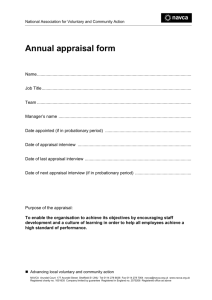

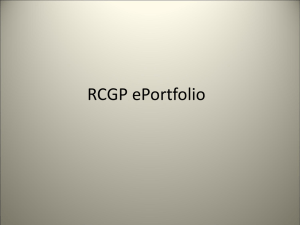
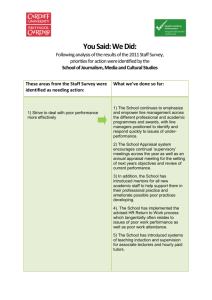
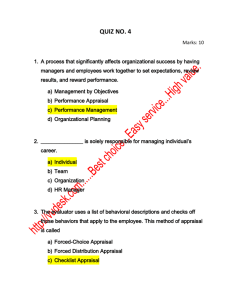
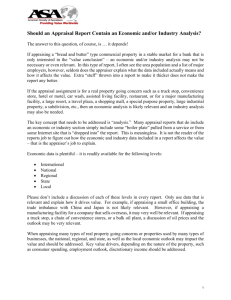
![Research Staff Appraisal Form [DOCX 28.24KB]](http://s3.studylib.net/store/data/006635694_1-a9e320ddf7ee7781752e374e83ac2bcf-300x300.png)
